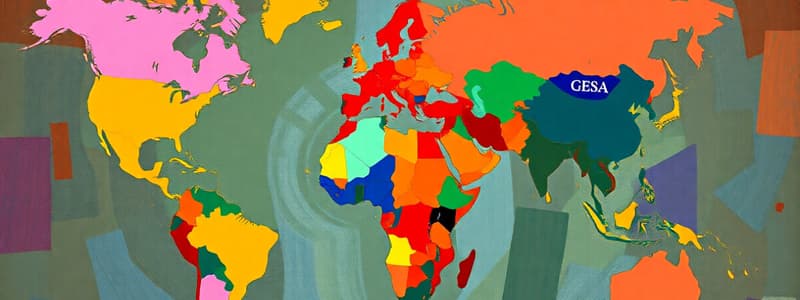Podcast
Questions and Answers
What is a primary strength of the state-centred approach in international relations?
What is a primary strength of the state-centred approach in international relations?
- It prioritizes non-state actors in shaping global affairs.
- It provides insights into historical trends and patterns in state interactions. (correct)
- It assumes all states behave irrationally.
- It emphasizes individuals as key decision-makers in state policies.
Which critique of the state-centred approach highlights its limited view on motivations of states?
Which critique of the state-centred approach highlights its limited view on motivations of states?
- It ignores the role of global markets.
- It assumes states are always rational actors. (correct)
- It fails to account for state institution effects.
- It emphasizes cooperation over conflict.
How does the state-centred approach view the role of national interests?
How does the state-centred approach view the role of national interests?
- As the primary driving factor behind state behavior. (correct)
- As irrelevant in modern international relations.
- As secondary to global norms and culture.
- As primarily shaped by non-state actors.
What limitation does the state-centred approach face regarding rapidly changing global dynamics?
What limitation does the state-centred approach face regarding rapidly changing global dynamics?
What aspect of international relations does the state-centred approach potentially overlook?
What aspect of international relations does the state-centred approach potentially overlook?
Why is the assumption of states as purely rational actors a critique of the state-centred approach?
Why is the assumption of states as purely rational actors a critique of the state-centred approach?
What does the state-centred approach struggle to analyze effectively?
What does the state-centred approach struggle to analyze effectively?
What does the critique regarding the focus on conflict in the state-centred approach imply?
What does the critique regarding the focus on conflict in the state-centred approach imply?
Flashcards
State-centric Approach
State-centric Approach
A theory that emphasizes the central role of the state in shaping international relations. It focuses on state power, interests, and actions in the global arena.
State Power
State Power
The ability of a state to influence and assert its will in the international system. It can include military power, economic power, and diplomatic influence.
State Interests
State Interests
A state's fundamental goals and desires in the international system, often centered around national security, economic prosperity, and promoting its values.
State Actions
State Actions
Signup and view all the flashcards
Impact of State Policies
Impact of State Policies
Signup and view all the flashcards
National Security Concerns
National Security Concerns
Signup and view all the flashcards
Oversimplification
Oversimplification
Signup and view all the flashcards
Ignoring Non-State Actors
Ignoring Non-State Actors
Signup and view all the flashcards
Study Notes
State-Centred Approach: Strengths
- Emphasis on the central role of the state in shaping international relations.
- Provides a framework for understanding state power, interests, and actions in the international arena.
- Useful for analyzing the impact of state policies, institutions, and actors on global affairs.
- Highlights the importance of national interests and security concerns in driving state behavior.
- Can explain instances of cooperation and conflict between states, examining how states interact and negotiate in the international system.
- Offers a robust analytical tool for understanding historical trends and patterns in international relations.
State-Centred Approach: Critiques
- Oversimplification of complex international interactions. Ignores the role of non-state actors.
- Neglects the influence of transnational forces, such as global markets, NGOs, and international organizations, on international relations.
- Potentially overlooks the role of ideas, norms, and culture in shaping state behavior.
- Fails to capture the complexity of interactions between states and their internal dynamics.
- Can be overly deterministic, implying that states are solely motivated by national interest and security, neglecting diverse motivations.
- The assumption that states are always rational actors can be inaccurate in assessing real-world scenarios.
- Limited explanatory power regarding rapidly changing global dynamics, like globalization, interdependence, and the rise of non-state actors.
- Possibility of overlooking the diverse and multifaceted nature of actors and interests beyond the state.
- Can be overly focused on conflict and power dynamics, potentially neglecting opportunities for cooperation and collaboration.
- May struggle to address issues requiring collective action and international cooperation effectively.
- Tends to create a rigid framework, often overlooking unintended consequences of state actions and behaviours.
- Ahistorical perspectives are present, leading to limitations in explaining current realities within the context of past historical experiences.
- Difficult to account for the increasingly blurred lines between domestic and foreign policy in an interconnected world.
Studying That Suits You
Use AI to generate personalized quizzes and flashcards to suit your learning preferences.
Description
Explore the strengths and critiques of the state-centred approach in international relations. This quiz delves into the role of the state, state power dynamics, and the influence of non-state actors on global affairs. Understand both the analytical framework provided and its limitations in capturing the complexity of international interactions.




